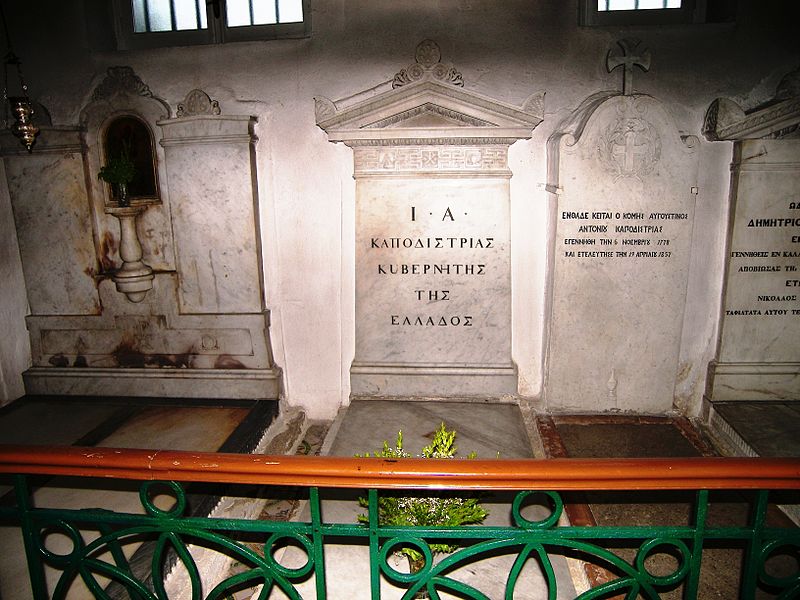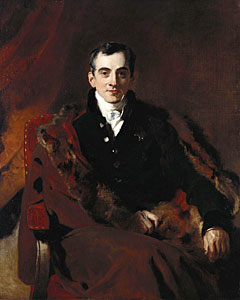<Back to Index>
- Prime Minister of Greece Alexandros Mavrokordatos (Αλέξανδρος Μαυροκορδάτος), 1791
- Governor of Greece Ioannis Antonios Kapodistrias (Ιωάννης Αντώνιος Καποδίστριας), 1776
PAGE SPONSOR
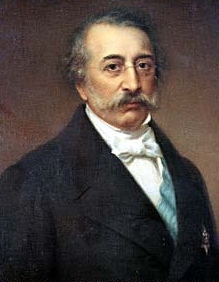
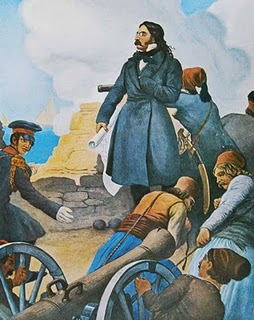
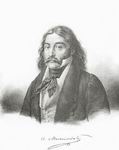
Alexandros Mavrokordatos (Greek: Αλέξανδρος Μαυροκορδάτος) (February 11, 1791, Constantinople, Ottoman Empire (now İstanbul, Turkey) – August 18, 1865, Aegina) was a Greek statesman and member of the Mavrocordatos family of Phanariotes.
In 1812, he went to the court of his uncle Jean Georges Caradja, Hospodar of Wallachia, with whom he passed into exile in Austria and Italy (1818), where he studied at the University of Padua. He was a member of the Filiki Eteria and was among the Phanariot Greeks who hastened to the Morea on the outbreak of the War of Independence in 1821. He was active in endeavoring to establish a regular government, and in January, 1822 he was elected by the First National Assembly at Epidaurus as the "President of the Executive".
He commanded the advance of the Greeks into western Central Greece the same year, and suffered a serious defeat at Peta on July 16, but reprieved this disaster somewhat by his successful resistance to the First Siege of Missolonghi (Nov. 1822 to Jan. 1823). His English sympathies brought him, in the subsequent strife of factions, into opposition to the "Russian" party headed by Demetrius Ypsilanti and Kolokotronis; and though he held the portfolio of foreign affairs for a short while under the presidency of Petrobey (Petros Mavromichalis), he was compelled to withdraw from affairs until February 1825, when he again became a Secretary of State. The landing of Ibrahim Pasha followed, and Mavrocordatos again joined the army, barely escaping capture in the disaster at Sphacteria, on May 9, 1825, by swimming to Navarino.
After the fall of Missolonghi (April 22, 1826) he went into retirement, until President John Capodistria made him a member of the committee for the administration of war material, a position he resigned in 1828. After Kapodistria's murder (October 9, 1831) and the resignation of his brother and successor, Augustinos Kapodistrias (April 13, 1832), Mavrocordatos became Minister of Finance. He was Vice - President of the National Assembly at Argos (July, 1832), and was appointed by King Otto as his Minister of Finance, and in 1833 Premier.
From 1834 onwards, he was Greek envoy at Munich, Berlin, London and, after a short interlude again as Premier of Greece in 1841, he was appointed envoy to Constantinople. In 1843, after the September 3rd uprising, he returned to Athens as Minister without portfolio in the Metaxas cabinet, and from April to August 1844 was head of the government formed after the fall of the Russian party. Going into opposition, he distinguished himself by his violent attacks on the Kolettis government. In 1854 - 1855 he was again head of the government for a few months. He died in Aegina on 18 August 1865.
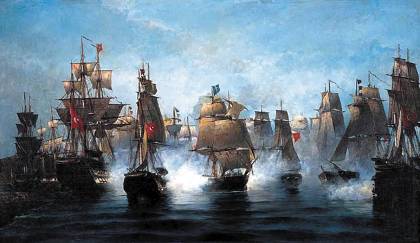
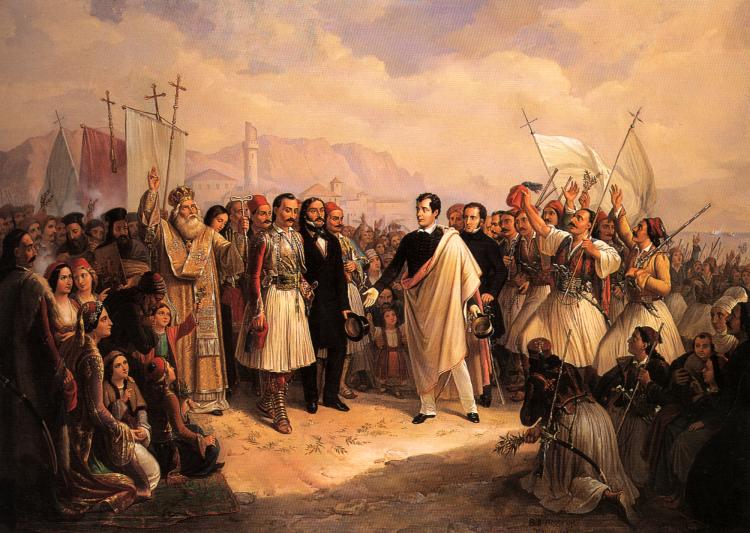
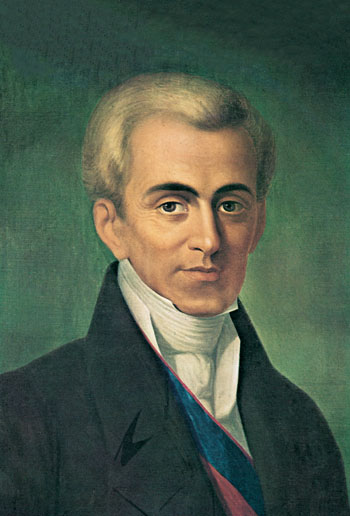
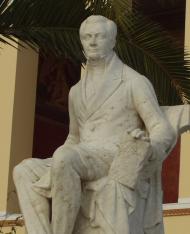
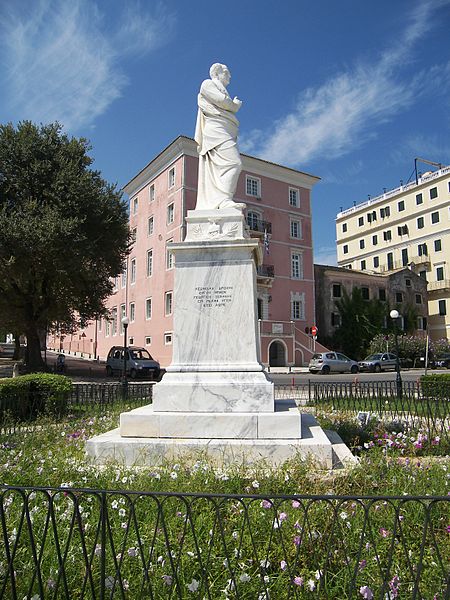
Count Ioannis Antonios Kapodistrias (Greek: Κόμης Ιωάννης Αντώνιος Καποδίστριας; other English transliterations include John Capodistrias, Johannes Capodistrias and Joannes Capodistria; February 11, 1776 – October 9, 1831) was a Greek diplomat of the Russian Empire and later the first head of state of independent Greece.
Ioannis Kapodistrias was born in Corfu (Κέρκυρα / Kerkyra in Greek), one of the Ionian Islands, which at the time of his birth were a possession of Venice. He studied medicine, philosophy and law at Padua, in Italy. When he was 21 years old, in 1797, he started his medical practice as a doctor in his native island of Corfu. He was throughout his life a deeply liberal thinker and a true democrat, though born and raised as a nobleman. An ancestor of Kapodistrias' had been created a conte (count) by Charles Emmanuel II, Duke of Savoy, and the title was later (1679) inscribed in the Libro d'Oro of the Corfu nobility; the title originates from Capodistria (formerly Justinopolis), a city on the eastern shore of the Gulf of Venice, now Koper in Slovenia and the place of origin of Kapodistrias' paternal family before they moved to Corfu in the 13th century where they changed their dogma from Catholic to Orthodox and they soon became hellenized. His family's name in Koper was Vitori or Vittori.
Kapodistrias' mother was Adamantine Gonemis (Αδαμαντία (Διαμαντίνα) Γονέμη), daughter of the noble Christodoulos Gonemis (Χριστόδουλος Γονέμης). The Gonemis were a Greek family originally from the island of Cyprus, they had migrated to Crete when Cyprus fell to the Ottomans in the 16th century. They then migrated to Epirus when Crete fell in the 17th century, finally settling on the Ionian island of Corfu. The Gonemis' had been listed in the Libro d'Oro Golden Book since 1606. In 1802 Ioannis Kapodistrias founded an important scientific and social progress organization in Corfu,
the "National Medical Association", of which he was an energetic
member. In 1799, when Corfu was briefly occupied by the forces of Russia and Turkey, Kapodistrias was appointed chief medical director of the military hospital.
After two years of revolutionary freedom, triggered by the French Revolution and the ascendancy of Napoleon, in 1799 Russia and the Ottoman Empire drove the French out of the seven Ionian islands and organized them as a free and independent state – the Septinsular Republic – ruled by its nobles. Kapodistrias, substituting for his father, became one of two ministers of the new state. Thus, at the age of 25, Kapodistrias became involved in politics. In Cephallonia he was successful in convincing the populace to remain united and disciplined to avoid foreign intervention and, by his argument and sheer courage, he faced and appeased rebellious opposition without conflict. With the same peaceful determination he established authority in all the seven islands.
He listened to the voice of the people and initiated democratic changes to the "Byzantine Constitution" that the Russian - Ottoman alliance had imposed, which caused the Great Powers to send an envoy, George Motsenigo, to reprimand him. However, when the envoy met Kapodistrias, he was impressed by the political and ethical worth of the man.
When elections were carried for a new Senate,
Kapodistrias was unanimously appointed as Chief Minister of State. In
December, 1803, a less feudal and more liberal and democratic
constitution was voted by the Senate. As a minister of state he
organized the public sector, putting particular emphasis on education.
In 1807 the French re-occupied the islands and they dissolved the
Septinsular Republic.
In 1809 Kapodistrias entered the service of Alexander I of Russia. His first important mission, in November 1813, was as unofficial Russian ambassador to Switzerland, with the task of helping disentangle the country from the French dominance imposed by Napoleon. He secured Swiss unity, independence and neutrality, which were formally guaranteed by the Great Powers, and actively facilitated the initiation of a new Constitution for the 19 cantons that were the component states of Switzerland, with personal drafts. In the ensuing Congress of Vienna, 1815, as the Russian minister, he counterbalanced the paramount influence of the Austrian minister, Prince Metternich, and insisted on French state unity under a Bourbon monarch. He also obtained new international guarantees for the Constitution and neutrality of Switzerland through an agreement among the Powers. After these brilliant diplomatic successes, Alexander I appointed Kapodistrias joint Foreign Minister of Russia (with Karl Robert Nesselrode).
In the course of his assignment as Foreign Minister of Russia, Kapodistrias' ideas came to represent a progressive alternative to Metternich's aims of Austrian domination of European affairs. Kapodistrias' liberal ideas of a new European order so threatened Metternich that he wrote in 1819:
Kapodistrias is not a bad man, but honestly speaking he is a complete and thorough fool, a perfect miracle of wrong - headedness... He lives in a world to which our minds are often transported by a bad nightmare.—Metternich on Kapodistrias
Metternich then tried to undermine Kapodistrias' position in the Russian court because he realized that Kapodistrias' progressive vision was antithetical to his own. Although Metternich was not a decisive factor in Kapodistrias' leaving his post as Russian Foreign Minister, he nevertheless attempted to actively undermine Kapodistrias by rumors and innuendo. According to the French ambassador to Saint Petersburg, Metternich was a master of insinuation and he attempted to neutralize Kapodistrias because he viewed him as the only man capable of counterbalancing Metternich's own influence on the Russian court.
More than anyone else he possesses the art of devaluing opinions that are not his own; the most honorable life, the purest intentions are not sheltered from his insinuations. It is thus with profound ingenuity that he knew how to neutralize the influence of Count Capodistrias, the only one who could counterbalance his own—French ambassador on Metternich
Metternich, by default, succeeded in the short term since Kapodistrias eventually left the Russian court on his own, but with time Kapodistrias' ideas and policies for a new European order prevailed.
He was always keenly interested in the cause of his native country, and in particular the state of affairs in the Seven Islands, which in a few decades’ time had passed from French revolutionary influence to Russian protection and then British rule. He always tried to attract his Emperor's attention to matters Greek.
Kapodistrias visited his Ionian homeland, by then under British rule, in 1818, and in 1819 he went to London to
discuss the islanders' grievances with the British government, but the
British gave him the cold shoulder partly because of the fact that,
uncharacteristically, he refused to show them the memorandum he wrote to
the czar about the subject. Kapodistrias became increasingly active in support of Greek independence from the Ottoman Empire, but did not succeed in obtaining Alexander's support for the Greek revolution of 1821. This
put Kapodistrias in an untenable situation and in 1822 he took an
extended leave of absence from his position as Foreign Minister and
retired to Geneva where he applied himself to supporting the Greek
revolution by organizing material and moral support.
Kapodistrias retired to Geneva, where he was greatly esteemed, having been made an Honorary Citizen for his past services to Swiss unity and particularly to the cantons. In 1827, he learned that the newly formed Greek National Assembly had, as he was the most illustrious Greek born politician in Europe, elected him as the first head of state of newly liberated Greece, with the title of Kyvernetes (Κυβερνήτης – Governor).
After touring Europe to rally support for the Greek cause, Kapodistrias landed in Nafplion 7 January 1828 and arrived in Aegina on 8 January 1828. It was the first time he had ever set foot on the Greek mainland, and he found a discouraging situation there. Even while fighting against the Ottomans was still going on, factional and dynastic conflicts had led to two civil wars which ravaged the country. Greece was bankrupt and the Greeks were unable to form a united national government.
From
the first capital of Greece, Nafplion, he ushered in a new era in the
country, which had just been liberated from a 400 year Turkish occupation. He founded schools, established Foundations for young women to work and inaugurated the first university. These Institutes educated the first teachers of liberated Greece.
On his arrival, Kapodistrias launched a major reform and modernization program that covered all areas. He re-established military unity, bringing an end to the second phase of the civil war; re-organized the military, which was then able to reconquer territory lost to the Ottoman military during the civil wars; introduced the first modern quarantine system in Greece, which brought epidemics like typhoid fever, cholera and dysentery under control for the first time since the start of the War of Independence; negotiated with the Great Powers and the Ottoman Empire the borders and the degree of independence of the Greek state and signed the peace treaty that ended the War of Independence with the Ottomans; introduced the phoenix, the first modern Greek currency; organized local administration; and, in an effort to raise the living standards of the population, introduced the cultivation of the potato into Greece.
The way Kapodistrias introduced the cultivation of the potato remains famously anecdotal today. Having ordered a shipment of potatoes, at first he ordered that they be offered to anyone interested. However the potatoes were met with indifference by the population and the whole scheme seemed to be failing. Therefore Kapodistrias, knowing of the contemporary Greek attitudes, ordered that the whole shipment of potatoes be unloaded in public display on the docks of Nafplion, and placed severe looking guards guarding it. Soon, rumors circulated that for the potatoes to be so well guarded they had to be of great importance. People would gather to look at the so-important potatoes and soon some tried to steal them. The guards had been ordered in advance to turn a blind eye to such behavior, and soon the potatoes had all been "stolen" and Kapodistrias' plan to introduce them to Greece had succeeded.
Furthermore,
as part of his program he tried to undermine the authority of the
traditional clans or dynasties which he considered the useless legacy of
a bygone and obsolete era. However, he underestimated the political and military strength of the capetanei (καπεταναίοι – commanders) who had led the revolt against Turkey in 1821, and who had expected a leadership role in the post - revolution Government. When a dispute between the capetanei of Laconia and
the appointed governor of the province escalated into an armed
conflict, he called in Russian troops to restore order, because much of
the army was controlled by capetanei who were part of the rebellion.
George Finlay's 1861 History of Greek Revolution records that by 1831 Kapodistrias's government had become hated, chiefly by the independent Maniates, but also by the Roumeliotes and the rich and influential merchant families of Hydra, Spetses and Psara. The Hydriots' customs dues were the chief source of the municipalities' revenue, so they refused to hand these over to Kapodistrias. It appears that Kapodistrias had refused to convene the National Assembly and was ruling as a despot, possibly influenced by his Russian experiences. The municipality of Hydra instructed Admiral Miaoulis and Mavrocordatos to go to Poros and to seize the Hellenic Navy's fleet there. This Miaoulis did, the intention being to prevent a blockade of the islands, so for a time it seemed as if the National Assembly would be called.
Kapodistrias called on the British and French residents to support him in putting down the rebellion, but this they refused to do, but Admiral Richord (or Ricord) took his ships north to Poros. Colonel (later General) Kallergis took a half - trained force of Greek Army regulars and a force of irregulars in support. With less than 200 men, Miaoulis was unable to make much of a fight; Fort Heidek on Bourtzi Island was overrun by the regulars and the brig Spetses (once Laskaria Bouboulina's Agamemnon) sunk by Richord's force. Encircled by the Russians in the harbor and Kallergis's force on land, Poros surrendered. Miaoulis was forced to set charges in the flagship Hellas and the corvette Hydra, blowing them up when he and his handful of followers returned to Hydra. Kallergis's men were enraged by the loss of the ships and sacked Poros, carrying off plunder to Nauplion.
The
loss of the best ships in the fleet crippled the Hellenic Navy for many
years, but it also weakened Kapodistrias's position. He did finally
call the National Assembly but his other actions triggered more
opposition and that led to his downfall.
In 1831, Kapodistrias ordered the imprisonment of Petrobey Mavromichalis, the Bey of the Mani Peninsula, one of the wildest and most rebellious parts of Greece. This was a mortal offense to the Mavromichalis family, and on October 9, 1831 (September 27 in the Julian Calendar) Kapodistrias was assassinated by Petrobey's brother Konstantis and son Georgios on the steps of the church of Saint Spyridon in Nafplio.
Kapodistrias woke up early in the morning and decided to go to church despite the urges of his servants and bodyguards to stay at home. When he reached the church he saw his assassins waiting for him. When he reached the church steps, Konstantis and Georgios came close as if to greet him. Suddenly Konstantis drew his pistol and fired, missing, the bullet sticking in the church wall where it is still visible today. He then drew his dagger and stabbed Kapodistrias in the stomach while Georgios shot Kapodistrias in the head. Konstantis was shot by General Fotomaras, who watched the murder scene from his own window. Georgios managed to escape and hide in the French Embassy; after a few days he surrendered to the Greek authorities. He was sentenced to death by a court - martial and was executed by firing squad. His last wish was that the firing squad not shoot his face, and his last words were "Peace Brothers!"
Ioannis Kapodistrias was succeeded as Governor by his younger brother, Augustinos Kapodistrias. Augustinos ruled only for six months, during which the country was very much plunged into chaos. Consequently, King Otto was given the throne of the newly founded Kingdom of Greece.
Kapodistrias is greatly honored in Greece today. The University of Athens is named "Kapodistrian" in his honor; the Greek euro coin of 20 lepta bears his face, as did the obverse of the 500 drachmas banknote of 1983 – 2001, before the introduction of the euro, and a local re-organization program that reduced the number of municipalities in the late 1990s also carries his name. The fears that Britain, France and Russia had of any liberal and Republican movement at the time, because of the Reign of Terror in the French Revolution, led them to insist on Greece becoming a monarchy after Kapodistrias' death. His summer home in Koukouritsa, Corfu, has been converted to a museum commemorating his life and accomplishments and has been named Kapodistrias Museum in his honor. It was donated by the late Maria Desylla - Kapodistria, grand niece of Ioannis Kapodistrias, to three cultural societies in Corfu specifically for that purpose.
On 8 December 2001 in the city Capo d'Istria (Koper) of Slovenia a lifesize statue of Ioannis Kapodistrias was unveiled in the central square of the city. The square was renamed after Kapodistrias, since Koper was the place of Kapodistrias' ancestors before they moved to Corfu in the 14th century. The statue was created by Greek sculptor K. Palaiologos and was transported to Koper with a ship of the Greek Navy. The ceremony was attended by the Greek ambassador and Eleni Koukou, a Kapodistrias scholar and professor at the National and Kapodistrian University of Athens.
In the area of bilateral relations between Greece and Slovenia the Greek minister for Development Dimitris Sioufas met on 24 April 2007 with his counterpart Andrej Vizjak, Economy minister of Slovenia, and among other things he mentioned: "Greece has a special sentimental reason for these relations with Slovenia, because the family of Ioannis Kapodistrias, the first Governor of Greece, hails from Koper of Slovenia. And this is especially important for us."
On 21 September 2009, the city of Lausanne in
Switzerland inaugurated a bronze statue of Kapodistrias. The ceremony
was attended by the Foreign Ministers of the Russian Federation, Sergei Lavrov and of Switzerland, Micheline Calmy - Rey.
